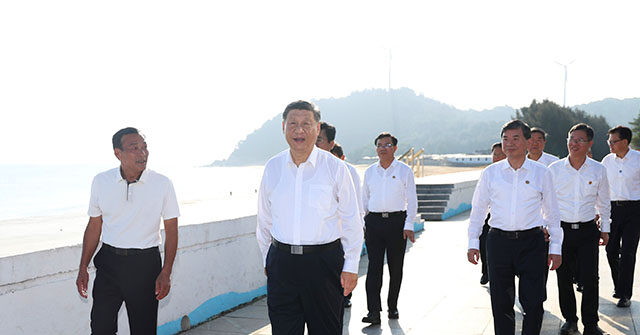In the midst of rising tensions surrounding Taiwan, Chinese President Xi Jinping recently visited Fujian province, a strategic area facing Taiwan. His visit occurred shortly after ordering military exercises designed to intimidate Taiwan, highlighting China’s aggressive stance towards the island, which it falsely considers a breakaway province. The tension escalated following Taiwanese President Lai Ching-te’s National Day speech on October 10, where he asserted Taiwan’s sovereignty while suggesting that collaboration between Taiwan and China on global issues like climate change could be possible. Lai’s comments were received with outrage in Beijing, leading to pronounced military posturing by the People’s Liberation Army (PLA) as a means of demonstration and intimidation.
State media emphasized Xi’s trip to Fujian as an effort to stimulate China’s struggling economy, rather than as a direct response to Taiwan. The Xinhua News Agency described Fujian as an economic hub integral to the country’s reform efforts, framing Xi’s visit as part of a broader initiative to enhance economic development and cultural exchanges with Taiwan. However, there were implications of a broader agenda to undermine Taiwanese identity in Fujian. Reports indicated that Xi aimed to reinforce Chinese national identity among Taiwanese residents in the region, suggesting an effort to blur the lines of Taiwanese distinctiveness in favor of a singular Chinese identity.
Surveys indicate a strong sense of Taiwanese identity, with 67 percent of respondents identifying as primarily Taiwanese as opposed to Chinese. Notably, among the younger population aged 18 to 34, this figure rises to 83 percent. The increasing perception of China as a threat has also led to claims that a significant majority of Taiwanese, about 68 percent, would be willing to defend their nation against Chinese aggression. Xi’s visit to Dongshan county, an island that has served as a base for military activities, coincided ominously with announcements of upcoming military drills aimed at projecting strength and authority in the Taiwan Strait.
The PLA’s military drills were explicitly deemed a response to Lai’s speech affirming Taiwan’s sovereignty, which Chinese officials characterized as a direct challenge to China’s territorial claims. The defense ministry’s insistence on peaceful reunification does not eliminate the threat of military action, as they explicitly stated there would be no concessions regarding Taiwan independence. This reflects a broader strategy by Beijing to quell any notions of Taiwan being an independent state, labeling Lai’s administration as separatist and resolute in its commitment to destabilizing a unified perception of Chinese territorial integrity.
In his speech, Lai extended an olive branch to Beijing, suggesting collaboration on issues of mutual concern while firmly rejecting China’s claims to Taiwan. He emphasized that the Republic of China, Taiwan’s formal title, predates the establishment of the People’s Republic of China, which is a point of significant contention in the ongoing narrative of cross-strait relations. China’s vehement reaction to Lai’s assertions exemplifies the sensitivity surrounding Taiwan’s identity and autonomy, as officials reiterated the narrative that Taiwan is an inseparable part of China. Their claims further entail criticism of any international engagements that Taiwan pursues, asserting that no country should recognize Taiwan’s separate status.
The situation underscores the fragile and volatile dynamics governing cross-strait relations, marked by China’s continuous attempts to consolidate its claims over Taiwan. Xi’s actions in Fujian and the PLA’s military exercises signify a dual approach of economic engagement and military intimidation designed to pressure Taiwan into a closer allegiance with Beijing. As the international community watches closely, the responses from both Beijing and Taipei will prove critical in determining the future trajectory of Taiwan’s sovereignty and its complex relationship with China. With public sentiment firmly leaning towards a distinct Taiwanese identity, any escalatory actions by China may further galvanize domestic support for maintaining independence, complicating prospects for peaceful dialogue and resolution.

